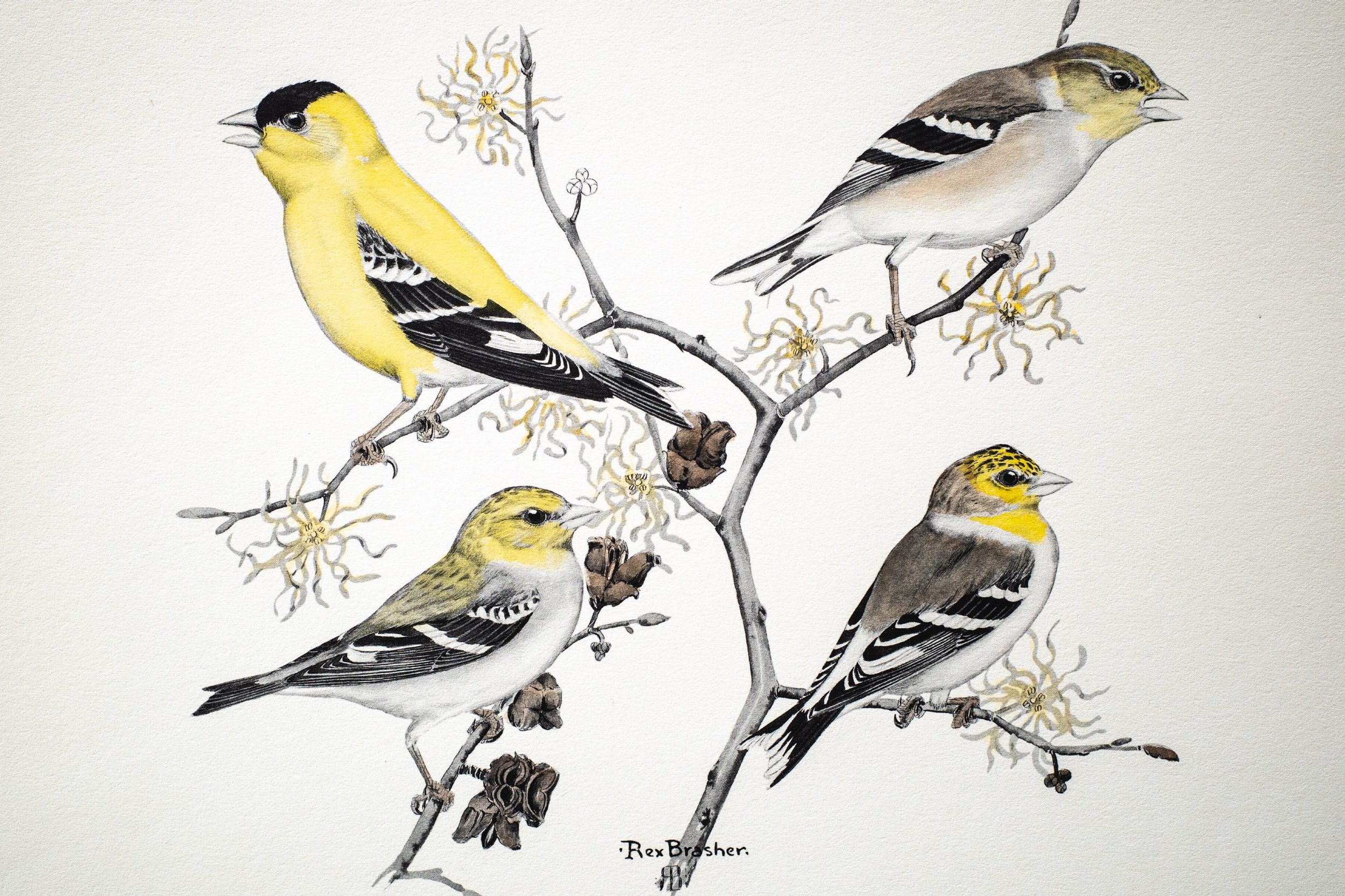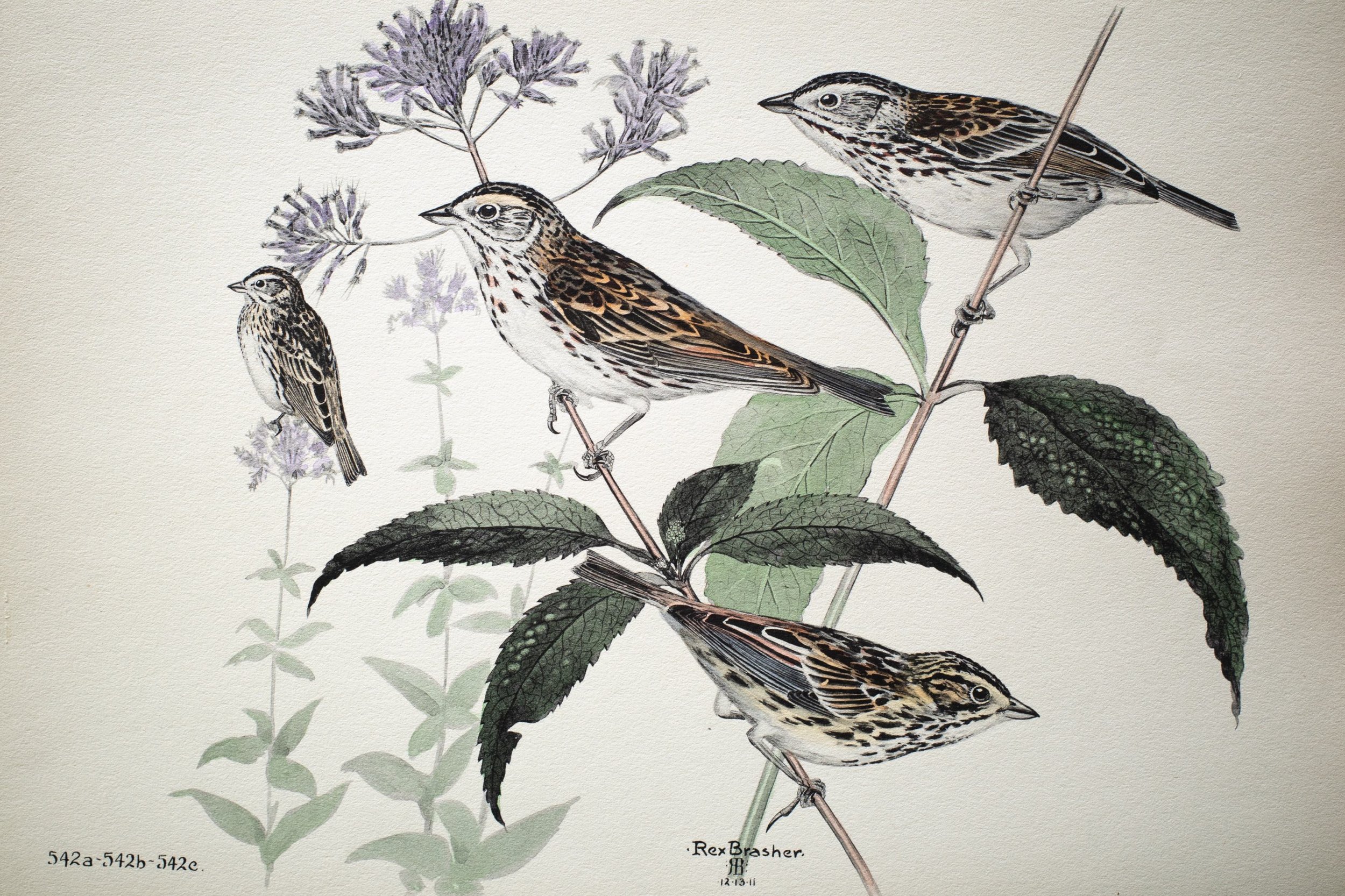All the goodness birds bring to our homes
Illustrations by Rex Brasher courtesy of the Rex Brasher Association
by Summer Tao
Editor’s Note: As we reflect on the gentle joy birds bring, we’re also mindful of those affected by the wildfires in LA, including many of our colleagues and friends, and all the crises unfolding worldwide. It's a reminder to extend kindness and be gentle with ourselves, our neighbors, and the creatures sharing our world as we all navigate tough times together. Every small act of care has the potential to make a big difference.My girlfriend and I live in a centrally located apartment building where the lawn is perfectly level and manicured. We're surrounded by other apartments and supermarkets. Birds are a rarity, but in summer, we sometimes catch sight of the red-winged starlings that reside on our roof. Sometimes, one perches on our open windows and looks quizzically into the apartment.
In our boundless creativity, we've named this creature Bird Friend. We're not even sure if we're seeing the same bird each time. But the sentiment holds true: In a world wracked by delivery trucks and foot traffic, this is our friend.
Nature's answer to noise pollution
Growing up alongside gardens and parks spoiled us with the bountiful presence of birds. We didn't know their generosity until we moved away. Birds hunt pests and aerate garden soil in their search for meals. They are cherished pollinators and masterful singers.
And that singing singles them out for greatness. Hearing birdsong in our environment is linked to reduced depressive symptoms. One study in Nature examined over 1200 participants and found a statistically significant link between hearing birdsong and feeling happy in people with and without depression.
Psychiatrist Dr. Heather Luing calls birdsong nature's soundtrack, saying that "our brains are hardwired to respond to it in a positive way. There is a hypothesis that when birds are singing, things are calm in the environment. Perhaps our brains are picking up this cue."
Birds aren't just present for our well-being. They're also a barometer for environmental wellness. Maren Gimpel, Associate Director of Foreman's Branch Bird Observatory works closely with birds in their home environment. She notes that, "Diverse bird life around your yard probably means your yard itself is diverse. While some bird species are generalists and can find the things they need in a variety of places, other species have specific preferences. The more bird species you have using your yard, the more varied your ecosystem probably is."
Birdsong also has the wonderful quality of being the polar opposite of noise pollution. It's soothing in precisely the way hearing lawnmowers aren't. Even in times when the dawn chorus wasn't what I wanted, I'd still heartily choose birds over weed wackers and delivery trucks.
They're also a feast for the eyes. Seeing birds regularly is also linked to better mental health outcomes. Part of this is because bird watching takes people into nature. You don't have to be an off-roading enthusiast with high-end camera gear, either. A garden or nearby park also counts. Bird watching combines joys of seeing nature and satisfying our curiosity into one accessible package. Dr. Luing links this to the theory of 'soft fascination', explaining that, "that doing a calming activity like this that engages our attention without stress or demands can be beneficial."
A bird in the home
Getting out to do bird watching isn't an option for everyone. I empathize with wanting to stay indoors, especially when my disability acts up. Which is why I've resolved to bring the birds here. Even on the third floor of a centrally located apartment building, there's space for birds. We can make that space. Dr. Luing calls birds, "some of the most resilient creatures and are constantly adapting to a wide range of environments and challenges,"' and I think there's a hidden call there to make their lives easier.
We can all do a little to make our homes more bird-friendly. And that little adds up to a lot. Maren cited some basics for welcoming the winged ones:
Provide shelter in the form of shrubbery, plants, or a birdhouse.
Birdbaths are highly entertaining for birds and the people watching them.
Native plants (potted or planted) provide food, shade, and comfort. She says that local garden centers will know the most bird-friendly varieties.
Safety matters. Treat or decorate windows so that birds are less likely to strike them. Keep cats indoors to discourage hunting.
Maren is realistic and says, "Don't feel like you have to take every suggestion you read. Make some small changes that best suit your space and lifestyle. Every action helps." It's reassuring to hear. For us, it started when we left a handful of sugar-free muesli on the window sill for the starlings.
I never thought about how easy bird watching is. I didn't realize that Googling the characteristics of the starling perched on our window counts as birdwatching. But the feeling of satisfaction in correctly identifying it and filing the info away was palpably real.
This talkative rooftop starling of ours is a male. The name Bird Friend has stuck, but my girlfriend and I also refer to every bird we see as “bird friend.” This naming scheme has some obvious practical shortcomings, but accurately reflects our opinion of the birds around us. It's a friendship that will hopefully only grow.
Summer Tao has a Masters in Psychology and is currently pursuing a PhD focused on LGBTQ+ healthcare in South Africa. Summer’s writing often covers topics including queer relationships, sexual health, tabletop gaming, and humor.



